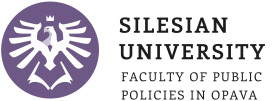AIMS AND SCOPE
TheáCentral European Papers (C.E.P.) is a peer reviewed, academic journal published bi-annually, in open access, by the Faculty of Public Policies of the Silesian University in Opava. The journal is dedicated to the advancement and development of latest thinking in public administration, politics, sociology, security and history in Central European countries. The Journal those publishes articles from different disciplines that cover and explain various issues of the political, economic, cultural and social development of Central Europe with regard to it┤s historical development, what presumes an interdisciplinary approach towards study of the region. The region's problems are presented in the context of the European integration process and in relation to global challenges and threats. Special attention is paid to various problems of the region after 1989, what reflects a special focus on the public administration related issues. Since very beginning of the journal, from 2013 editorial board understands Central Europe as a region in a broader sense, with the reflection of numerous authors, who defined and understood Central Europeá as „Inter Europe (Zwischen-Europa) – for centuries served as a buffer state between Western Europe and Russia. We have to note that Central Europe is such a historical, geographical, political landscape, and such a natural region formed by diverse geographical, ethnographical, political, cultural factors“ (Vizi 2013, 5) at the same time Central Europe as a region was strongly influenced by three different power centres such as Vienna, Berlin and also Moscow during past centuries. Therefor the journal of Central European Papers accepts political and geographical point of view, where among core Central Europe belong countries such areas as the alpine states (Austria, Switzerland, Germany, Liechtenstein and Slovenia), Visegrad Group countries and also the other states, or their significant parts with strong Central European influence, among which also belong Baltic states (Lithuania, Latvia and Estonia), Ukraine, Belarus, Romania, Croatia, Bosnia and Herzegovina, Montenegro and Serbia.


